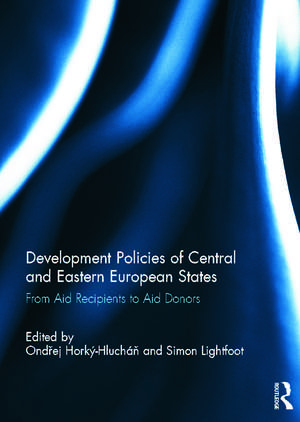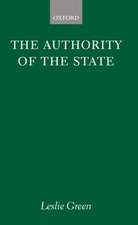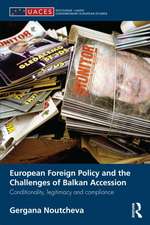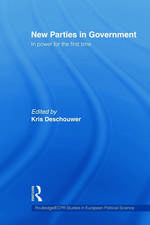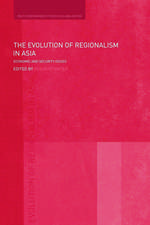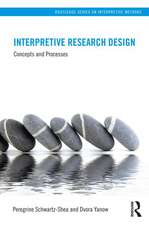Development Policies of Central and Eastern European States: From Aid Recipients to Aid Donors
Editat de Ondřej Horký-Hlucháň, Simon Lightfooten Limba Engleză Hardback – 6 dec 2012
This book was published as a special issue of Perspectives on European Politics and Society
| Toate formatele și edițiile | Preț | Express |
|---|---|---|
| Paperback (1) | 175.22 lei 6-8 săpt. | |
| Taylor & Francis – 18 iul 2015 | 175.22 lei 6-8 săpt. | |
| Hardback (1) | 496.53 lei 6-8 săpt. | |
| Taylor & Francis – 6 dec 2012 | 496.53 lei 6-8 săpt. |
Preț: 496.53 lei
Preț vechi: 687.99 lei
-28% Nou
Puncte Express: 745
Preț estimativ în valută:
95.02€ • 103.18$ • 79.82£
95.02€ • 103.18$ • 79.82£
Carte tipărită la comandă
Livrare economică 23 aprilie-07 mai
Preluare comenzi: 021 569.72.76
Specificații
ISBN-13: 9780415639125
ISBN-10: 0415639123
Pagini: 144
Dimensiuni: 174 x 246 x 13 mm
Greutate: 0.43 kg
Ediția:New.
Editura: Taylor & Francis
Colecția Routledge
Locul publicării:Oxford, United Kingdom
ISBN-10: 0415639123
Pagini: 144
Dimensiuni: 174 x 246 x 13 mm
Greutate: 0.43 kg
Ediția:New.
Editura: Taylor & Francis
Colecția Routledge
Locul publicării:Oxford, United Kingdom
Cuprins
1. From Aid Recipients to Aid Donors? Development Policies of Central and Eastern European States Ondřej Horký and Simon Lightfoot
2. The Transfer of the Central and Eastern European ‘Transition Experience’ to the South: Myth or Reality? Ondřej Horký
3. Visegrad Countries’ Development Aid to Africa: Beyond the Rhetoric Dominik Kopiński
4. Hungarian International Development Cooperation: Context, Stakeholders and Performance Balázs Szent-Iványi
5. Development Discourse in Romania: From Socialism to EU Membership Mirela Oprea
6. Involving Civil Society in the International Development Cooperation of ‘New’ EU Member States: The Case of Slovenia Maja Bucar
7. Assessing the Aid Effectiveness of the Czech Republic: Commitment to Development Index and Beyond Petra Krylová, Miroslav Syrovátka and Zdenĕk Opršal
8. Development Cooperation of the Baltic States: A Comparison of the Trajectories of Three New Donor Countries Evelin Andrespok and Andres Ilmar Kasekamp
2. The Transfer of the Central and Eastern European ‘Transition Experience’ to the South: Myth or Reality? Ondřej Horký
3. Visegrad Countries’ Development Aid to Africa: Beyond the Rhetoric Dominik Kopiński
4. Hungarian International Development Cooperation: Context, Stakeholders and Performance Balázs Szent-Iványi
5. Development Discourse in Romania: From Socialism to EU Membership Mirela Oprea
6. Involving Civil Society in the International Development Cooperation of ‘New’ EU Member States: The Case of Slovenia Maja Bucar
7. Assessing the Aid Effectiveness of the Czech Republic: Commitment to Development Index and Beyond Petra Krylová, Miroslav Syrovátka and Zdenĕk Opršal
8. Development Cooperation of the Baltic States: A Comparison of the Trajectories of Three New Donor Countries Evelin Andrespok and Andres Ilmar Kasekamp
Recenzii
Fewer and fewer donor country studies have been published in recent years. In particular, the aid policies of the New Member States have been in the shadows for a long time. This volume is not only timely but also plays the important role of demystifying some of the central roles which were conferred to the development assistance programmes of these emerging donors.
Prof. dr. Paul Hoebink, Director Centre for International Development Issues Nijmegen, Radboud University Nijmegen, The Netherlands
This volume provides a clear and sophisticated analysis of actors, processes, and policies of the new (or re-emerging) donors in Central and East Europe. It draws on a number of different theoretical approaches, provides new empirical material, and challenges existing assumptions. By doing so, not only does it fill a gap in the academic literature, but is set to become an essential reading for all those who want to have a better understanding of the new global aid architecture.
Maurizio Carbone, Professor of International Development and Jean Monnet Professor of EU External Relations Director of PhD Programme in Politics, School of Social and Political Sciences, University of Glasgow, Scotland.
Prof. dr. Paul Hoebink, Director Centre for International Development Issues Nijmegen, Radboud University Nijmegen, The Netherlands
This volume provides a clear and sophisticated analysis of actors, processes, and policies of the new (or re-emerging) donors in Central and East Europe. It draws on a number of different theoretical approaches, provides new empirical material, and challenges existing assumptions. By doing so, not only does it fill a gap in the academic literature, but is set to become an essential reading for all those who want to have a better understanding of the new global aid architecture.
Maurizio Carbone, Professor of International Development and Jean Monnet Professor of EU External Relations Director of PhD Programme in Politics, School of Social and Political Sciences, University of Glasgow, Scotland.
Descriere
This volume analyses the journey taken by Central and Eastern Europe states in moving from recipients of aid to donors of aid.
This book was published as a special issue of Perspectives on European Politics and Society.
This book was published as a special issue of Perspectives on European Politics and Society.
